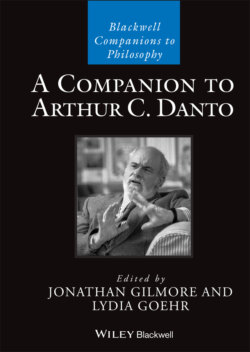Читать книгу A Companion to Arthur C. Danto - Группа авторов - Страница 49
3 Agents’ Powers
ОглавлениеDanto would surely be right to insist that the first-person point of view from which mental agency is exercised, by undertaking irreducibly normative commitments, must also be a first-person point of view from which embodied agency is exercised so as to effect changes in the world. He would be right to insist, as well, that no account of the distinctive nature of the first-person knowledge that agents possess can be complete unless it includes an account of agents’ knowledge of their powers to act. So the question arises, what would it be to try to make sense of agents’ first-person knowledge of their powers to act in normative terms? Levi’s definition of an option suggests an answer to this question.
According to Levi, to face an option is to have a certain kind of first-person belief: I face an option to perform a certain action X just in case I believe that if I choose X then X will be done (it is implicit in this belief that X will be done by me, of course – it is, after all, a first-person belief). Levi’s interest in choice is an interest in rational choice, and the rational thing to do in his view is to choose the option that emerges to be best in the light of all of one’s commitments – best, that is, in the light of all of one’s beliefs about what is true and good, where these beliefs include one’s beliefs about what one will do if one chooses it (one’s options). Levi does not think we need a philosophical account of how a choice is efficacious, any more than Bilgrami thinks we need a philosophical account of how we come to possess self-knowledge of our commitments, or Danto thinks we need a philosophical account of how we are able to perform basic actions directly at will. Levi holds that it suffices to register what agents think, from their own first-person points of view, in the course of exercising their agency. In his view, to register this is to register the normative basis from which agents self-knowingly deliberate, choose, and act.
Danto sets aside the issue of choice. He wants to make sense of how willing can be located within actions themselves, and so need not be preceded by any separate mental act such as choice or intention. It is a perfectly good goal to try to make sense of this idea – an idea that is sometimes put by saying that intending is in the doing. Nevertheless, it seems to me that the kind of first-person knowledge of our powers to perform basic actions that Danto attributes to us must in some sense be conditional knowledge – knowledge that we will perform the actions if we will them. For it is not as though the power to perform such actions drives us to perform them all the time, and when we are not performing them we know that it lies within our power to perform them in certain conditions. This is part of what Levi is getting at when he defines options in the way that he does – they are things we will do if we choose to do them. To some extent, we can make sense of such conditionality without bringing in an explicit act of choice, as follows: my knowledge that I can perform a certain kind of action is a belief that I will perform it insofar as I think it is called for by the circumstances in which I find myself, where to think it is called for is precisely to will it in the weak sense of recognizing that it is worth doing. In such a case, there would be no separation between willing and doing – my actions would literally be informed by thoughts, in the form of beliefs about what difference they make in the world, and about the worth of that difference.
I have been exploring the extent to which it might be fruitful to bring a normative orientation in the philosophy of action to bear in our efforts to make sense of Danto’s conception of basic actions. But when we adopt a normative orientation, we must also ask: Does Danto’s distinction between basic and non-basic actions hold any normative significance for the first-person point of view of agency – that is, is it something that agents ought to take due account of when they deliberate and act? My preliminary answer to this question is that its normative significance is very limited. From a normative point of view, the paramount questions that an agent faces concern: what actions are open to me to perform, and among them, which are more worth doing, and which is most worth doing? The subsidiary question which, among the actions that are open to me, are basic vs. non-basic appears to be a mere how-to question.
Danto does not regard this as a merely subsidiary, how-to, question, but rather as a question of philosophical significance – a significance that I will continue to probe in the next section.
